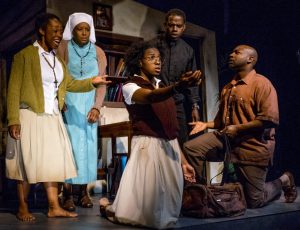Bloody past is prologue in MOXIE Theatre’s quite moving ‘Kibeho’
To hear Roman Catholicism’s Holy See tell it, the Blessed Virgin Mary is only too happy to walk among us every so often. Her reported visits, replete with her quiet smile and gentle voice and robin’s egg blue cowl, are known as the Marian apparitions, nine of which have been ecclesiastically documented in modern years. Everybody knows about Mary’s stays at Fatima, Portugal in 1917 (during which she allegedly forecast the rise of Russian communism) and at Lourdes, France in 1860 (some half-million visit the Holy Mother’s shrine there each year; except for Paris, tiny Lourdes has the most hotels per capita in the nation).
MOXIE Theatre is staging an account of the most recent such event, titled Our Lady of Kibeho in deference to the Church’s place-name pattern; it not only designates the apparition site after Mary but also declares that God vacations in its parent country. The place is Rwanda, a nation of about 11.8 million in East-Central Africa – but unlike Dad, Mary wasn’t there to soak up the rays at nearby Lake Victoria. She’d come with an earnest warning she imparted to three schoolgirls, and the staging of this microcosm turns out to be the show’s great strength.
Playwright Katori Hall and director Jennifer Eve Thorn have a clear understanding of their divisions of labor; the result is a quite moving (if underexplored) look at one of the most catastrophic genocides in the history of civilization.

Alphonsine (Cashae Monya, left) exhorts classmate Anathalie (center) as Sister Evangelique, Father Tuyishime and Nkango (Yolanda Franklin, Vimel Sephus and Durwood Murray) look on. PHOTO BY DAREN SCOTT
There’s a cadence to most of this script, with Hall touching on several angles that make the characters what they are – indeed, Sister Evangelique is a compelling figure as head nun, her sense of godly unworthiness fueling her martinet disposition. Similarly, youthful school director Father Tuyishime assumes a deadpan swagger amid his commitment to the cloth (“I don’t think you’re lying,” he tells Mumureke from a confessional; “I think you’re crazy”). Hall also hasn’t forgotten the secular repercussions amid the girls’ allegations; the ladies endure their classmates’ predictable teasing ad nauseam, and Mukamazimpaka’s father intrudes at school to vent on the effects the flap is having within his family.
But Hall’s script is also topheavy with such writing, as the history behind the massacre comes across too light. Both Tutsi and Hutu students attend Kibeho, with each contingent trading almost playful jabs, hardly the stuff of prewar diatribe. And to listen to Evangelique and Mumureke, Mary’s message is intended for Habyarimana. To the exclusion of his advisors, militia and citizenry? Hardly believable, especially amid Evangelique’s deepening fear for Rwandan sovereignty. Hall is surely well-intentioned, but she underwrites in spots, including the threadbare parts about the stolen kiss Mumureke plants on Tuyishime and about the wishy-washy Bishop Gahamanyi, who’s ready to close the school one minute and supports a devil’s advocate inquiry the next.
But don’t doubt the culture of ensemble in which this cast is immersed. The show flows across the stage like the beautiful bird it is, with Cashae Monya’s Alphonsine sporting a smile that’s born at once of befuddlement and benevolence. Tyrah Hunter’s Anathalie and Mallory Johnson’s Marie-Claire complete the trio of envoys, each with their own sets of believable quirks and boisterous outlooks. Yolanda Franklin’s Evangelique and Vimel Sephus’ Tuyishime click just fine amid their polar-opposite emotional make-ups.
Steve Froelich’s devil’s advocate Father Flavia is OK, except the character seems to treat this case as if it were his first (there’s also a hint or two that he’s tipped a few in his day; more of that would have made for good subtext). And it was exceptionally nice to see oft-acclaimed Antonio (TJ) Johnson again, although through no fault of his his Bishop Gahamanyi evolves at cross-purposes.
Please do marvel at the climactic stage picture, meant to illustrate Mary’s fire-and-brimstone forecast. To a person, the tech crew deserves every good wish for this – each depicted tragedy is across the street from the others, and the effect is positively stunning.

Tears streak a Rwandan boy’s face as bloodshed engulfs the country in 1994. File photo from YouTube.
This review is based on the opening-night production of May 7. Our Lady of Kibeho runs through May 29 at MOXIE Theatre, 6663 El Cajon Blvd. $15-$30. moxietheatre.com, (858) 598-7620.

Martin Jones Westlin, principal at editorial consultancy Words Are Not Enough and La Jolla Village News editor emeritus, has been a theater critic and editor/writer for 25 of his 47 years…
More…


